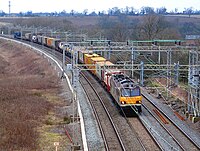
Photo from wikipedia
Transporting of extremely large indivisible loads (10 000–30 000 t) is becoming increasingly popular to allow offsite modular construction of infrastructure for oil and gas, mining, and renewable energy projects in remote… Click to show full abstract
Transporting of extremely large indivisible loads (10 000–30 000 t) is becoming increasingly popular to allow offsite modular construction of infrastructure for oil and gas, mining, and renewable energy projects in remote areas. Such exceptionally large transient loads could encounter unusual geohazards: there is a risk of metastable liquefaction when crossing soft alluvium, causing sudden failure, potential casualties, and severe production delays. Furthermore, temporary roads for these payloads are a large cost to such projects; conventionally designed earthworks and (or) ground improvement are often unaffordable or logistically impossible. This laboratory study indicates the fabric can be strengthened, and the hazard reduced, if the soil is subjected to careful repeated loading that rearranges the initially precarious fabric through gradual accumulation of plastic strains. A novel remediation technique for these temporary haul roads is proposed: managed deployment of increasingly heavy haul vehicles could result in staged fabric rearrangement that strengthens the soil to the point where it would be safe for the heavy vehicles to use it. In so doing, a more economic temporary haul road is open to operations (coupled with observation methods to ensure adequate performance throughout) and production activities are not overly disrupted.
Journal Title: Canadian Geotechnical Journal
Year Published: 2019
Link to full text (if available)
Share on Social Media: Sign Up to like & get
recommendations!